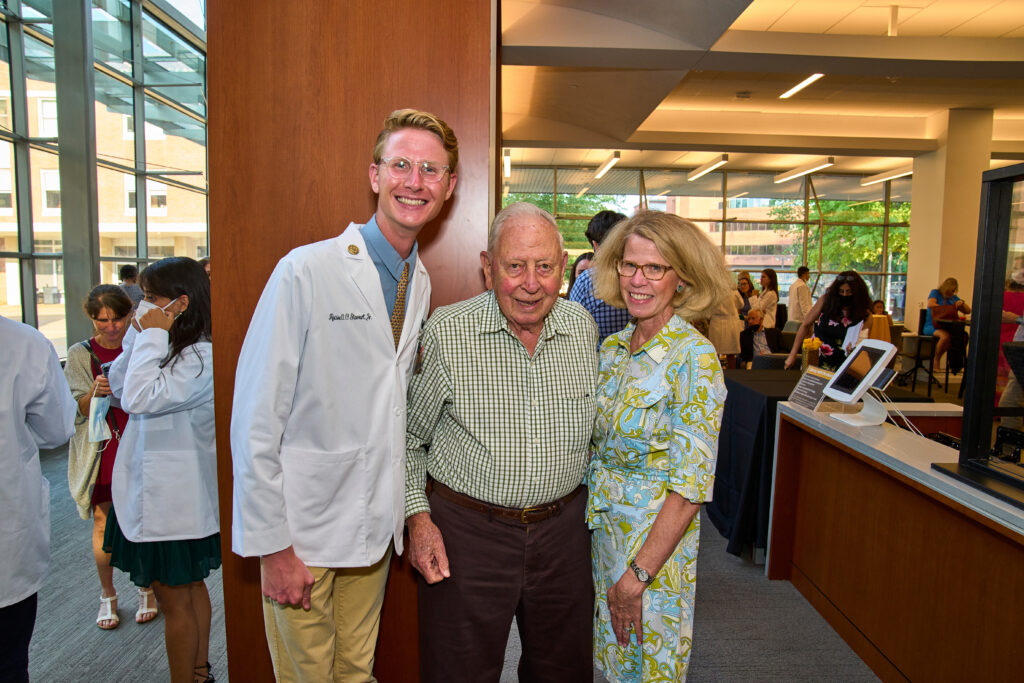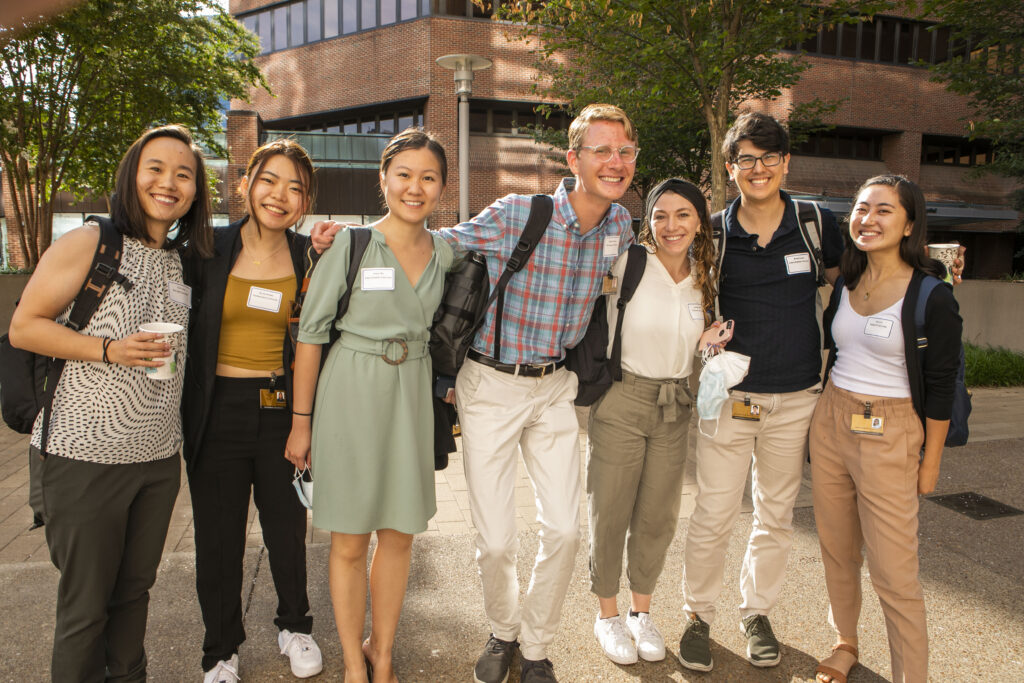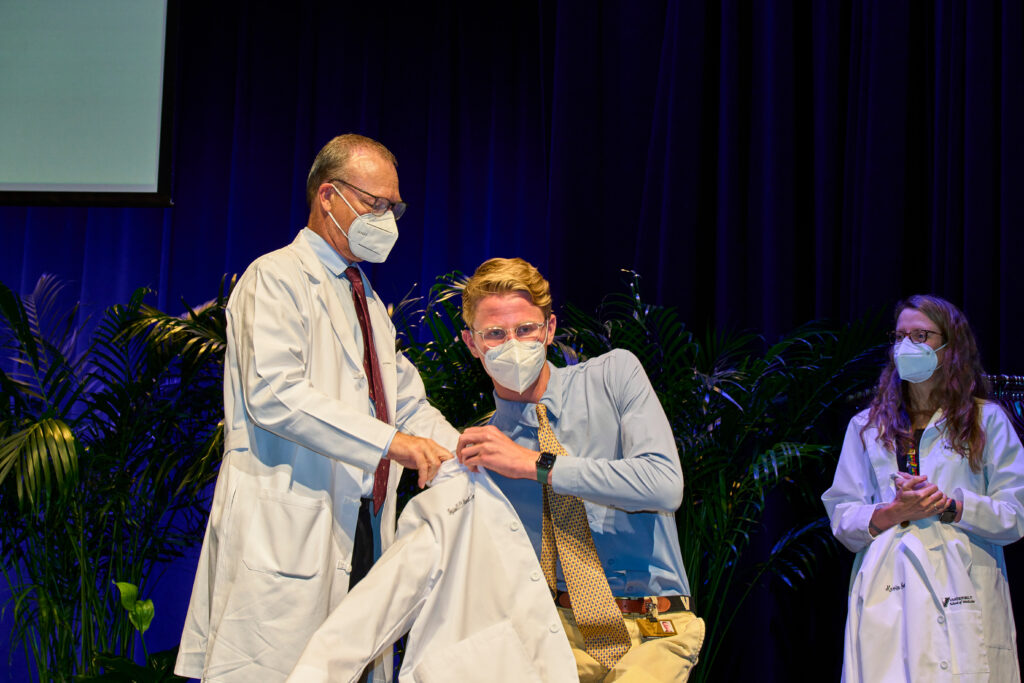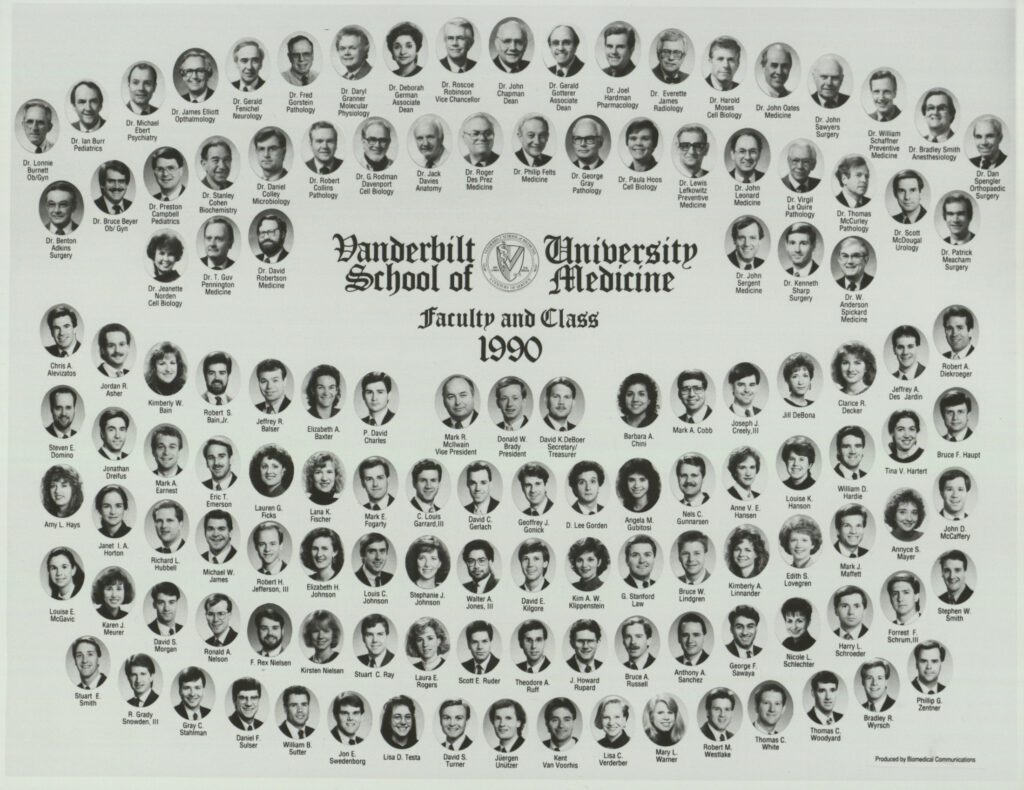Though his family has a long history at Vanderbilt University School of Medicine, Russell O. Stewart Jr. keeps his focus on the future in an ever-changing field
By: Lexie Little
In 1920, Vanderbilt University School of Medicine sat at the intersection of present-day Fifth Avenue and Elm Street in Nashville, now a forgotten lot adjacent to a Greyhound bus station. Emblematic, perhaps, that a hub of movement and drive sits at the intersection where a historical medical legacy took root, not only for the school but for a family – one that looks ever forward to innovation and progress.
Dr. Robert Warner walked the halls of the old School of Medicine buildings before all academic and clinical operations moved to Vanderbilt University’s campus in 1925, the site — albeit changed with time and technology— where his great-grandson now begins his medical training. Warner entered medical school at a time when physicians and educators pushed for more rigorous, standardized, and scientific training amid vast variation in standards and specialty recognition.
“My great-grandfather, Robert Warner, was at this school before it was on this campus, when it was downtown,” M1 Russell Stewart Jr. said. “He was so early that ophthalmology as a field was not yet a specialty in the U.S. He had to go to Austria to do his residency because Americans just didn’t know enough about the field yet. It’s amazing to see how much has changed.”

Oddly enough, the first endowed chair in the School of Medicine, established in 1960, came in the form of the George W. Hale Professorship in Ophthalmology. Much later would come the Margaret and John Warner Chair Neurological Education, named in honor of professor emeritus of neurology Dr. John Sloan Warner Sr. and his wife. John Warner, Stewart’s grandfather, graduated from VUSM in 1956. Later, Stewart’s uncle (a vascular surgeon) and mother would join the Vanderbilt alumni ranks in 1988 and 1990, respectively.
This week during Reunion 2022, Dr. Mary Laird Warner, a pulmonologist and critical care specialist at National Jewish Health, assumes her role as president of the Vanderbilt Medical Alumni Association Board. Meanwhile, her son studies in Eskind Biomedical Library as he continues a legacy while pushing toward the future.
Taking a new approach
Stewart says his family never pressured him into pursuing a medical career or into coming to Vanderbilt. The research blocks built into the curriculum, the attention from faculty in undergraduate medical education, (the MD program before residency, or graduate medical education), and the student body’s commitment to service ensured a fourth generation would enter VUSM.

“The curriculum has really been updated since my mom was here to include more research. That’s one reason I decided to come to Vanderbilt,” Stewart said. “It’s a positive change. I’m excited to get into in my third-year curricular time for that. I appreciate the university’s efforts with Shade Tree Clinic and other organizations to reach out to more diverse communities across Nashville in a more inclusive vision of the city.
“Students seem to be really passionate about helping their community, and it seemed like a very supportive environment internally, too. That service mindset and the community mindset was really refreshing, and I appreciated that. I also appreciated the extent to which faculty really seem to be passionate about undergraduate medical education. They seem to really care about making Vanderbilt the best medical school it could be for undergraduate medical education.”
Medical education and the broader field change every day thanks to research and innovation, and Stewart looks forward to potential innovations ahead, especially advances in biomedical informatics, including clinical genomics and artificial intelligence.
Continuing a sequence
After finishing his degree in biological engineering at Dartmouth College, Stewart worked as a research engineer at a genetics startup in San Diego, California.
Stewart designed and built new, next-generation DNA sequencing and multiomic sequencing platforms, using biology and engineering principles to create tools to read patients’ unique DNA and RNA and visualize protein and mRNA expressions. Such analysis expands our understanding of relationships between different cell parts and their distinct roles in health and medicine. Multiomic data provide research and clinical insights in an ever-expanding range of fields such as oncology, infectious disease, and molecular pathology.
New technologies and advances in informatics, Stewart said, will inform his time at VUSM and beyond just as they did the generations before him. For this reason, he plans to continue one tradition followed by each of his physician family members: choosing a completely different specialty than his predecessors.

“I think automation and intelligence have the potential to improve the speed and accessibility of care,” he said. “I also think that it will really help to enable more personalization and precision in medicine, with the goal of a more patient-centered care; to have diagnoses and treatment that more accurately reflect the individual and their actual biology in place of population-based assumptions or stereotypes. This can help to unpack the effects of biological diversity, environmental inequality, and social discrimination from what can become obfuscating stereotypes.”
Though technologies and medical education have changed, one commitment at Vanderbilt remains unwavering: service.
Feeding the future
Stewart worked on his family’s produce farm in Cherry Hills Village, Colorado, where his father serves as mayor. They grew squash, pumpkins, tomatoes, and the like, providing heirloom produce to local restaurants, community nutrition nonprofits, and family and friends. He found a passion for food, which he actively brings to VUSM through the Vanderbilt Educational Garden Initiative (VEGI), a student organization dedicated to fighting food insecurity.
Students grow fresh vegetables in campus and community gardens, reaching out to the community to distribute fresh produce and promote a nutritious lifestyle.
“I think [VEGI] will be a great way to do something in Nashville’s community that is entirely non-medical but that I just really enjoy,” Stewart said. “
As he walks toward the garden on the campus almost two miles away from where his great-grandfather studied, Stewart appreciates the connections to the past while embracing a race toward the future. He’s all too familiar with races as an avid endurance athlete, having been part of the triathlon team at Dartmouth and continuing to run and cycle through Nashville in his free time. But when he slows down, he considers all that Vanderbilt means to him now as a student.
His deans, Senior Associate Dean for Health Sciences Education Donald Brady and Vanderbilt School of Medicine Dean Jeffrey Balser, graduated in the same class as his mother. Warner had told her son stories about her classmates who looked toward the future (and toward advancements for future generations).

Perhaps even the deans have changed since their time in medical school, growing in their service and leadership. Vanderbilt continues to progress, moving forward with each new generation while honoring the legacies of those who came before. And Russell Stewart is content to do just that, here where Garland Avenue meets 21st avenue – where medicine meets the 21st century.